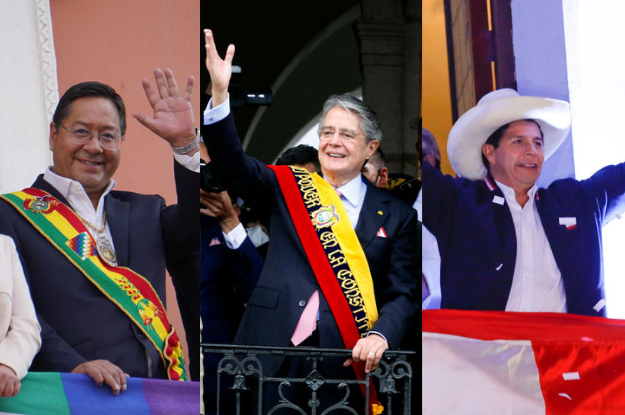Every time a Latin American country goes to the polls, some analysts suggest that the region is taking a turn to the left or right, depending on who wins the election. A closer look at recent election results—especially those that have occurred since the pandemic began to ravage the region—tells a much simpler story: People are consistently voting against incumbents.
More than a turn to the left, Latin American voters seem to be voting to bring the state back in. With an already sizable and, as the pandemic has further exposed, largely inefficient and often corrupt public sector, the choice voters are making is likely to end up disappointing them. The newly elected will face the same hurdles, fueling greater discontent with democracy and frustration with their governments.
With several upcoming elections in the region—including presidential contests in Chile and Honduras and a midterm election in Argentina—the mood of the electorate should be worrisome, especially for the right-wing ruling coalition in Chile and for the left-wing government in Argentina. And though they will have more time to recover (their presidential elections are scheduled for May and October 2022, respectively), Colombian President Iván Duque (who cannot run for re-election) and Brazilian President Jair Bolsonaro should also be concerned with the growing anti-incumbent sentiment in the region.
Ahead of Chile’s November presidential election, it is true that right-wing presidential candidate Sebastián Sichel is doing better than expected in polls. He surprisingly won the primary for the right-wing coalition by defeating a man who had led the polls for over two years, Joaquín Lavín, a former mayor and twice previous presidential candidate—a sign that among right-wing voters, the dominant mood was also in favor of fresh faces and a new message. Yet, Sichel will find it more difficult to disassociate himself from the unpopular outgoing president Sebastián Piñera. After all, Sichel served in Piñera’s cabinet and his association with the government will be duly exploited by both far-right and left-wing rivals in the upcoming presidential campaign. Just as right-wing parties face an uphill battle to retain their 40% share of seats in congress, Sichel will need to struggle to distance himself from Piñera to become a viable candidate.

In Argentina, the midterm elections in November will renew 127 of the 257-seat Chamber of Deputies and only 24 of the 72 seats in the Senate. The Peronist ruling coalition is likely to retain control of Congress, but voters might send a clear signal of discontent that will force a reckoning in the administration of President Alberto Fernández. As the real leader of the Peronists is Vice President Cristina Fernández de Kirchner (no relation), a setback for the Peronists could trigger a call to nominate a presidential candidate other than Alberto in 2023 or, if the defeat is too overwhelming, a call for Cristina to step aside.
It’s the economy – and health
More than a shift to the left (Bolivia, Peru, Chile) or to the right (Ecuador), discontent with government responses to the pandemic and worries about economic downturns in their countries are pushing Latin Americans to vote against incumbents. In some countries, like Ecuador or Bolivia, outgoing presidents even chose not to support any candidates to avoid damaging their chances. In turn, presidential candidates sought to distance themselves from the outgoing government to avoid losing popular support. In other places, government coalition parties have done exceptionally bad at the polls. In Chile, Piñera’s right-wing coalition Chile Vamos elected less than 25% of the representatives chosen in May’s constitutional convention election and won only one of the 16 regional governments. In Mexico, the government coalition suffered a setback in the July midterm elections. Most recently, the referendum championed by President Andrés Manuel López Obrador on his initiative to bring to trial former Mexican presidents failed miserably when only 7% of those eligible to vote turned out to the polls. Though an overwhelming majority voted in favor of the government’s favored position, the turnout was far below the 40% participation threshold required for the government to be able to act on that mandate.
Can challengers deliver on high expectations?
Though idiosyncratic variables also play a role in explaining the defeat of each incumbent government, the fact that no elected government has been able to win a presidential election or national referendum since early 2020—and most incumbents were already losing elections for the two years before the pandemic began—speaks volumes about the mood of the average voter in Latin America. People want to punish incumbents and they want new faces that can bring about new hopes.
The dominant message among those that have emerged as winners in recent elections in the region combines the concept of new faces, an anti-corruption platform and the promise of a larger safety net (with a more efficient and stronger public health sector). Though the post-pandemic economic recovery should bring a tailwind that will help consolidate support for the new governments, higher fiscal spending incurred during the pandemic will pose a big challenge to the new administrations. The need to return to fiscal discipline and higher interest rates will limit their ability to build the bigger safety nets they have campaigned on. A decades-long effort to promote good governance has shown that corruption cannot be easily eradicated from the region. Moreover, after the rebound effect in economic recovery vanishes, the structural problems for sustained and inclusive economic growth remain in most countries. People’s discontent with incumbents may lead them to support challengers in Latin America. But as the case of Peru—where Pedro Castillo won on the promise to solve new problems with old recipes that have repeatedly failed—has recently reminded us, challengers might well position to represent popular discontent, but many do not seem to have a viable roadmap to put the country back on the right track.
The electoral market in Latin America currently favors challengers over incumbents. But as challengers become incumbents, the structural problems faced by their countries and the high expectations voters have placed on them will pose gigantic challenges to their administrations. Since it will not be easy to meet the expectations, the anti-incumbent sentiment now prevalent in the region might continue to be dominant even after the pandemic comes under control.
Fortunately, there is a simple and proven alternative. When Latin American countries have had governments that combine market-friendly policies with the responsible adoption of social policies to reduce inequality and promote economic inclusion focusing on improving human capital, the results have always been successful. Though policies based on nostalgia normally do not work, evidence-based policies that tackle problems, respond to the legitimate concerns of suffering populations, and make countries attractive to foreign investments by exploiting their comparative advantages have always worked out well. The bad news for Latin America is that the challenges are formidable and that popular discontent is on the rise. The good news is that election winners have a proven recipe to put their countries back on the right track.
—
Navia is professor of liberal studies at NYU and of political science at Diego Portales University in Chile.









